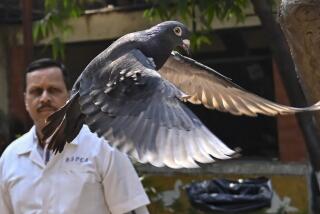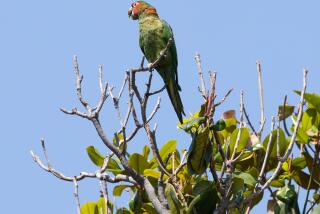An Idea Hatched in Frustration: Stream of Water Dispels Flock of Pigeons : WILDLIFE
- Share via
Some people love pigeons, as demonstrated by their feeding tidbits to them in public places.
Other people consider pigeons the most obnoxious and unsanitary of all birds.
For those in the second group, control has been discouraging. But now comes discovery of something that really sends them flying--a sudden stream of water from a hose. Pigeons can’t stand the stuff.
The discovery was accidental, borne from frustration over a noisy flock congregating above an oleander hedge and raiding the cat’s bowl of food. Surely, the same idea must have occurred to others over the long course of civilization.
But I’d never heard of it.
And so, for the possible benefit of mankind and without a single regret for the feelings of pigeon lovers, here’s the technique:
Attach a nozzle to your hose that will produce a sharp spray reaching 15-20 feet into the air. When pigeons (there never seems to be only one) roost on a tree or utility wire, give them a blast.
They fly away in panic.
Something approaching them suddenly probably startles them. However, I like to think they are just antagonistic to the cleansing potential of water.
Of course, being pigeons, they come back.
Then it becomes a test of wills--and your ability to cram into their birdbrain that they are not wanted.
If you spray them again, and perhaps another time, they often will depart for hours. This is helpful since few folks, no matter how aggravated, have the time to stand outside firing frequent blasts of water at pigeons.
By now, my flock is so well trained that it will fly away if I even walk into the area without picking up the hose. This needs daily reinforcing. And there’s no guarantee on how long this might work for you.
Some years ago, the University of Arizona’s John L. Stair compiled a paper titled “Feral Pigeon Control.” The control possibilities were pretty discouraging .
A “feral pigeon” was described as a domestic pigeon that has returned to wild status and, unless banded, does not belong to anyone.
Pigeons, said Stair, “account for the spread of 57 known diseases and parasites . . . and their droppings create an unsanitary situation around homes, picnic areas and buildings.”
He said they transmit such human diseases as salmonellosis, histoplasmosis, trichomoniasis, meningitis and the Schistosomiasis trematode and give Newcastle disease to domestic animals, especially chickens and turkeys.
There’s no question their droppings create a mess,
More to Read
Sign up for Essential California
The most important California stories and recommendations in your inbox every morning.
You may occasionally receive promotional content from the Los Angeles Times.










